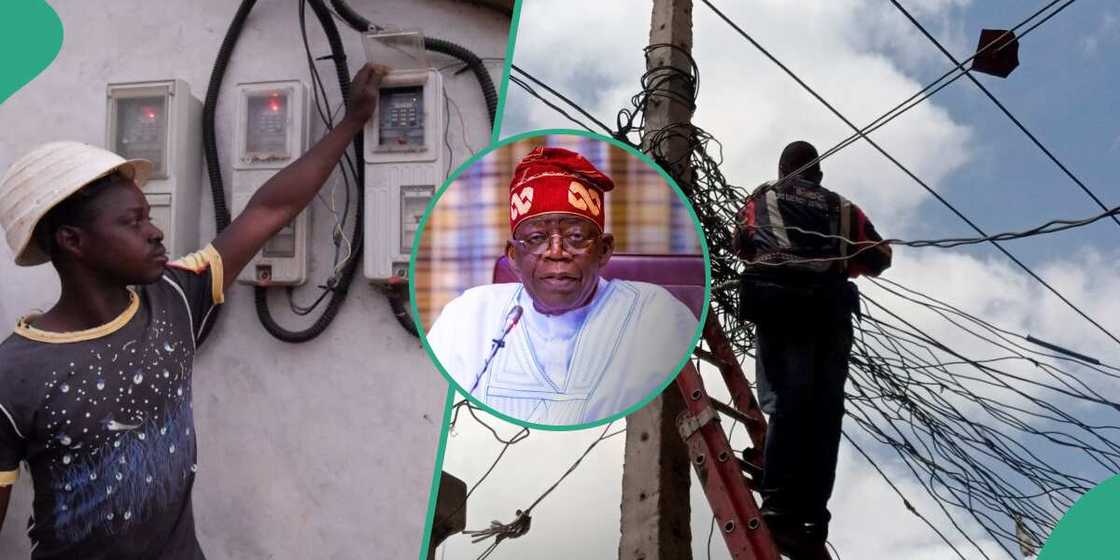Nigerians React As FG Plans Fresh Electricity Tariff Hike
- There are expectations that the federal government will announce another electricity tariff increase
- After increasing tariffs, the government plans to also introduce subsidies that will protect low-income Nigerians
- Nigerians have reacted to the plans to increase electricity tariffs a few months after announcing a 300% increase
Legit.ng journalist Dave Ibemere has over a decade of business journalism experience with in-depth knowledge of the Nigerian economy, stocks, and general market trends.
Nigerians have rejected the plans by the Federal Government to raise electricity tariffs from N116.18 to N193.63 per kilowatt-hour.
The plan to increase electricity by about 66.67% was disclosed by Olu Verheijen, special adviser to President Bola Tinubu on Energy.

Source: Getty Images
He disclosed this while speaking during the Africa Heads of State Energy Summit in Dar es Salaam, Tanzania.
Bloomberg reports quoting Verheijen that the new tariff will be implemented over the next few months as part of efforts to ensure the sustainability of the country's power sector.
Verheijen said that Nigeria was working towards a "cost-efficient but cost-reflective tariff" that would generate sufficient revenue for the power sector and attract private investments while safeguarding vulnerable populations.
Verheijen said:
"One of the key challenges we are looking to resolve over the next few months is transitioning to a cost-efficient but cost-reflective tariff.
"This will ensure that the sector generates the revenue required to attract private capital, while also protecting the poor and vulnerable."
Why Nigeria plans to increase tariff
Daily Trust reports that the fresh move to increase tariffs comes amid mounting financial pressure on Nigeria's electricity distribution companies, which are burdened by debts and in need of a more cost-reflective tariff system to enhance their financial viability.
In 2024, the Nigerian Electricity Regulatory Commission (NERC) implemented a 300% tariff increase for customers in Band A, raising the rate from N68 per kilowatt-hour (kWh) to N225/kWh. The tariff was later reduced to N209.50 due to public outcry.
Verheijen however promised that any rise in tariffs would need to be balanced by subsidies to protect less-affluent electricity users.
Nigerians react to new tariff hike
Kunle Olubiyo, president of the Nigeria Consumer Protection Network stated that rising tariffs would not necessarily result in better service.
Olubiyo pointed out that despite a 500% increase in tariffs since the privatisation of the sector, Nigeria's electricity supply continues to fall short of the nation's needs, with less than 6,000 megawatts available to power a population of over 200 million.
Olubiyo said:
"The efficiency level remains stagnant. Even if the tariff increases to N1,000 per kilowatt-hour, it will not guarantee improved quality of service or longer hours of electricity supply.
Sunday Oduntan, the executive director of research and advocacy of the Association of Nigerian Electricity Distributors has also rejected the planned hike, Punch reports.
He said:
"Today, only people in Band A pay the true cost of electricity. If you are in Band B, C, D, or E, the government is subsidising your electricity consumption by as much as 67% which means you are not even paying up to half of what you should be paying, and the so-called subsidy is not being paid by the government."

Read also
50% tariff hike: Subscribers open up on next line of action after failing to reach truce with NCC
Dangote leads as manufacturers generate more electricity than FG
Legit.ng reported over 250 companies and academic institutions have ditched the national grid to generate their electricity.
The total amount of electricity generated by the firms and institutions is about 6,500MW, higher than Nigeria’s consumption.
The Dangote Group generates the highest electricity with 1,500MW, while other companies and institutes generate 5,000MW.
Proofread by Kola Muhammed, journalist and copyeditor at Legit.ng
PAY ATTENTION: Сheck out news that is picked exactly for YOU ➡️ find the “Recommended for you” block on the home page and enjoy!
Source: Legit.ng




